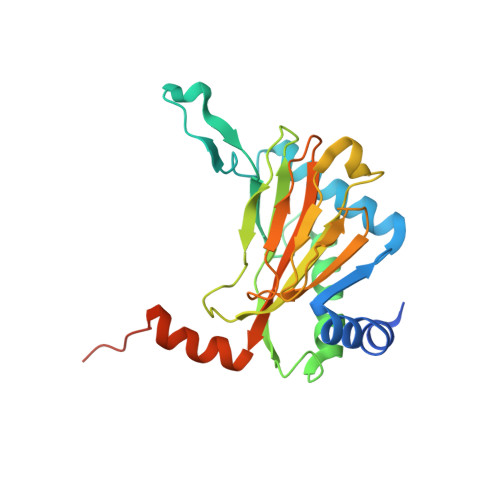Structural basis for oxygen degradation domain selectivity of the HIF prolyl hydroxylases.
Chowdhury, R., Leung, I.K., Tian, Y.M., Abboud, M.I., Ge, W., Domene, C., Cantrelle, F.X., Landrieu, I., Hardy, A.P., Pugh, C.W., Ratcliffe, P.J., Claridge, T.D., Schofield, C.J.(2016) Nat Commun 7: 12673-12673
- PubMed: 27561929
- DOI: https://doi.org/10.1038/ncomms12673
- Primary Citation of Related Structures:
5L9B, 5L9R, 5L9V, 5LA9, 5LAS, 5LAT, 5LB6, 5LBB, 5LBC, 5LBE, 5LBF - PubMed Abstract:
The response to hypoxia in animals involves the expression of multiple genes regulated by the αβ-hypoxia-inducible transcription factors (HIFs). The hypoxia-sensing mechanism involves oxygen limited hydroxylation of prolyl residues in the N- and C-terminal oxygen-dependent degradation domains (NODD and CODD) of HIFα isoforms, as catalysed by prolyl hydroxylases (PHD 1-3). Prolyl hydroxylation promotes binding of HIFα to the von Hippel-Lindau protein (VHL)-elongin B/C complex, thus signalling for proteosomal degradation of HIFα. We reveal that certain PHD2 variants linked to familial erythrocytosis and cancer are highly selective for CODD or NODD. Crystalline and solution state studies coupled to kinetic and cellular analyses reveal how wild-type and variant PHDs achieve ODD selectivity via different dynamic interactions involving loop and C-terminal regions. The results inform on how HIF target gene selectivity is achieved and will be of use in developing selective PHD inhibitors.
Organizational Affiliation:
Chemistry Research Laboratory, Department of Chemistry, Oxford Centre for Integrative Systems Biology, University of Oxford, Mansfield Road, Oxford OX1 3TA, UK.




















